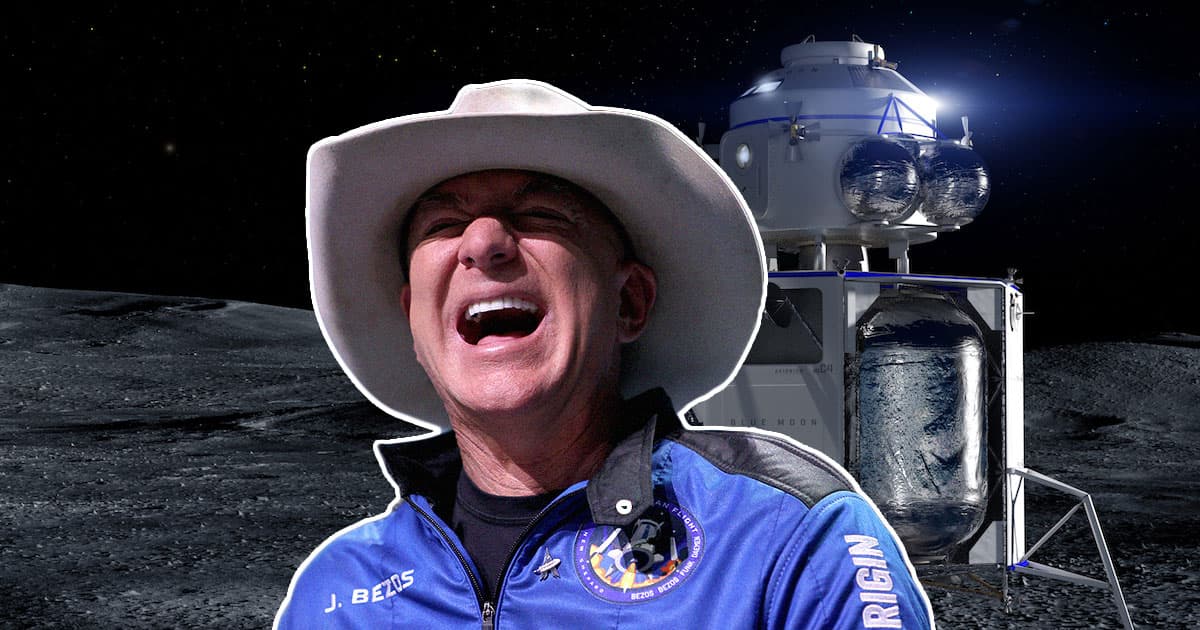Two years after losing NASA's much-coveted Human Landing Systems (HLS) contract to SpaceX and its explosion-prone Starship spacecraft, Jeff Bezos' rocket company Blue Origin has finally scored some of its own federal funding to build a lunar lander.
After Blue Origin made a huge fuss over NASA's decision to award SpaceX — and SpaceX only — the almost $3 billion HLS contract back in 2021, the agency established a second initiative called the Sustaining Lunar Development program.
And today, NASA officially awarded a Blue Origin-led team, which also includes industry titans Lockheed Martin and Boeing, a $3.4 billion contract for its upcoming Artemis V mission.
Put simply, Bezos has finally got his consolation prize, possibly — but by no means certainly — putting an end to years of bickering between two of the richest men in the world.
Before we go on, here's a little refresher: Artemis II is the first scheduled crewed mission of NASA's Orion spacecraft and will involve a crewed lunar flyby. NASA selected SpaceX's Starship as its lunar lander — but not launch rocket — for its Artemis III mission, the first planned lunar landing mission, which is tentatively scheduled for 2025. Artemis IV will add NASA's Lunar Gateway to the mix.
And the agency's Artemis V mission is slated to launch in 2029, and will involve sending astronauts from the Lunar Gateway to the Moon's south pole inside Blue Origin's lunar lander.
"Today we are excited to announce Blue Origin will build a human landing system as NASA’s second provider to deliver Artemis astronauts to the lunar surface," said NASA Administrator Bill Nelson in an announcement, adding that "we are in a golden age of human spaceflight."
NASA backed up its decision to award Blue Origin the contract, arguing that adding a second lunar lander system partner "will increase competition, reduce costs to taxpayers, support a regular cadence of lunar landings, further invest in the lunar economy, and help NASA achieve its goals on and around the Moon in preparation for future astronaut missions to Mars."
"We want more competition," Nelson added. "It means that you have reliability. You have backups."
Much love was lost over the years leading up to today's decision, a process that was fraught with fingerpointing, mudslinging, and legal action.
The original HLS contract sent sparks flying, with Bezos and SpaceX CEO Elon Musk repeatedly butting heads over who got to enjoy the fruits of NASA's ambitious plans to return humans to the Moon.
Things really started heating up when Blue Origin called out NASA's decision to award its HLS contract to SpaceX as being "flawed," accusations that culminated in Bezos suing NASA.
Musk took the opportunity to tear into Bezos, going as far as to suggest that Bezos should be zapped "on the head with our space lasers."
"He should consider spending some money on actual lunar lander hardware, instead of shady lobbyists," Musk tweeted at the time.
Blue Origin didn't take these accusations lightly and attempted to undermine public confidence in SpaceX's Starship launch platform, arguing that it was "immensely complex and high risk."
Meanwhile, NASA was trapped in the crossfire, stuck with its own heavy-launch rocket that wasn't just years late, but billions of dollars over budget.
To its relief, NASA's Space Launch System performed admirably during the agency's first Artemis mission late last year, an uncrewed journey around the Moon and back.
The mission sets the stage for both SpaceX and Blue Origin, which now have their work cut out to live up to their promises of developing a reliable capsule capable of safely delivering astronauts to the lunar surface.
While SpaceX has made tangible progress in developing its Starship spacecraft — explosions notwithstanding — we have yet to see much of Blue Origin's "Blue Moon" lander beyond some renders and a full-scale dummy lander being delivered to NASA back in 2020.
Fortunately, Blue Origin has a bit more time, with until 2029 to get its ducks in a row.
Beyond the bitter feud between the two space companies, today's news highlights NASA's immense confidence in the private space industry to realize its goal of returning the first astronauts to the lunar surface in over half a century.
"This is an incredible pivot in history," Ars Technica's Eric Berger tweeted. "We have a private competition to build landers to put humans on the Moon, with fixed price contracts, that pits two of the richest Americans against one another."
"This is not your mama's NASA," he added.
More on Artemis: NASA's New Artemis II Graphics Are So Freaking Awesome
Share This Article
